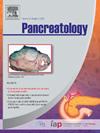开具胰酶疗法处方以治疗不可切除胰腺癌患者的吸收不良:新西兰和澳大利亚横断面调查。
IF 2.7
2区 医学
Q2 GASTROENTEROLOGY & HEPATOLOGY
引用次数: 0
摘要
目的调查新西兰奥特亚罗瓦和澳大利亚的临床医生为无法切除的胰腺癌患者开具胰酶替代疗法(PERT)处方的情况:方法: 采用混合媒体广告活动招募合适的临床医生填写调查问卷,收集人口统计学数据、处方药物信息以及对 PERT 指南的认识:研究招募了 161 名临床医生,其中 93 名和 68 名受访者分别来自新西兰奥特亚罗瓦和澳大利亚。两国的大多数受访者都是经验丰富的胃肠外科医生和营养师。与其他群体相比,新西兰奥特亚罗瓦的临床医生和营养师更常使用粪便弹性蛋白酶诊断 PEI。临床医生倾向于开出较少的 PERT 处方,并就用药时间提出错误建议。来自新西兰奥特亚罗瓦州和澳大利亚的大多数临床医生都不知道任何有关 PERT 的最佳临床实践指南(分别为 70% 和 77%):本研究表明,临床医生过度依赖粪便弹性蛋白酶来诊断胰腺癌,并且不确定 PERT 的正确剂量和用药时机,无法使无法切除的胰腺癌患者获得最佳治疗效果。大多数临床医生不了解最佳实践指南。本文章由计算机程序翻译,如有差异,请以英文原文为准。
Prescribing of pancreatic enzyme therapy for malabsorption in unresectable pancreatic cancer: Cross-sectional survey across New Zealand and Australia
Objective
To investigate the practices of clinicians prescribing pancreatic enzyme replacement therapy (PERT) for unresectable pancreatic cancer in Aotearoa New Zealand and Australia.
Methods
A mixed media advertising campaign was used to recruit appropriate clinicians to complete a questionnaire that collected demographic data, information regarding prescribed medication, and awareness of PERT guidelines.
Results
The study recruited 161 clinicians, with 93 and 68 respondents from Aotearoa New Zealand and Australia respectively. Most respondents from both countries were experienced gastrointestinal surgeons and dietitians. Aotearoa New Zealand clinicians and dietitians used faecal elastase more frequently to diagnose PEI than other groups. Clinicians had a tendency to under-prescribe PERT, and to advise incorrectly on the timing of the medication. The majority of clinicians from Aotearoa New Zealand and Australia were not aware of any best practice clinical guidelines for PERT (70 % and 77 %, respectively).
Conclusion
This study suggests clinicians are over-reliant on faecal elastase to diagnose PEI and are uncertain about the correct dose and timing of PERT for optimal patient benefit in those with unresectable pancreatic cancer. Most clinicians were not aware of best practice guidelines.
求助全文
通过发布文献求助,成功后即可免费获取论文全文。
去求助
来源期刊

Pancreatology
医学-胃肠肝病学
CiteScore
7.20
自引率
5.60%
发文量
194
审稿时长
44 days
期刊介绍:
Pancreatology is the official journal of the International Association of Pancreatology (IAP), the European Pancreatic Club (EPC) and several national societies and study groups around the world. Dedicated to the understanding and treatment of exocrine as well as endocrine pancreatic disease, this multidisciplinary periodical publishes original basic, translational and clinical pancreatic research from a range of fields including gastroenterology, oncology, surgery, pharmacology, cellular and molecular biology as well as endocrinology, immunology and epidemiology. Readers can expect to gain new insights into pancreatic physiology and into the pathogenesis, diagnosis, therapeutic approaches and prognosis of pancreatic diseases. The journal features original articles, case reports, consensus guidelines and topical, cutting edge reviews, thus representing a source of valuable, novel information for clinical and basic researchers alike.
 求助内容:
求助内容: 应助结果提醒方式:
应助结果提醒方式:


